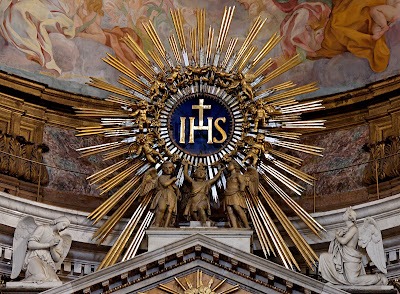Thursday of the Fifth Week of Lent
Reading I: Genesis 17:3–9
Psalm: 105:4–5, 6–7, 8–9
Gospel: John 8:51–59
Sacred Scripture places great emphasis on the power of a name. Jesus’s own name is none other than the Greek form of the Hebrew Joshua, meaning God saves. The title of Emmanuel, also ascribed to Jesus, simply means God with us. Both of these names, Jesus and Emmanuel, serve as a kind of one-word synopsis of the entirety of Sacred Scripture. After all, what is salvation history if not the story of how Jesus saves us, how God is with us?
In today’s Gospel, however, Jesus makes a point of repeating a different divine appellation, one which we’ve heard several times in the past few days: “Before Abraham was, I am” (John 8:58). With this declaration Jesus is explicitly identifying Himself with the name of God. Notice as well that He doesn’t say, “Before Abraham was, I was.”
As St. Thomas Aquinas points out in his commentary, Jesus’s use of the present form “am” is a decisive refutation of the Arian heresy which plagued the early Church. In other words, Jesus is saying He always has been, always is, and always will be. But why does He say, “Your father Abraham rejoiced that he was to see my day; he saw it and was glad” (John 8:56)? As our father in faith, Abraham—himself the recipient of a new name in confirmation of his new identity—is told in our first reading that his descendants will maintain an everlasting covenant with God. But whereas God promised the earthly land of Canaan to Abraham, deep down the patriarch must have known that this was not enough. It couldn’t be enough that all his descendants forever and ever would live and suffer and die purely for the sake of a plot of land. In his heart of hearts, Abraham knew that something greater lay ahead, that death had yet to be conquered, that Someone greater than he was yet to come.
And so he rejoiced in anticipation of that day when the promise of the physical land of Canaan would be replaced with the promise of our heavenly inheritance. Jesus Christ stands before us today as God the Father’s fulfillment of that promise.
Do I exhibit a radical Christian joy in my interactions with those around me?
How can I cultivate a habit of gratitude as a means toward growing in joy?
Reference:
Journey Through Lent: Reflections on the Daily Mass Readings by Clement Harrold


No responses yet